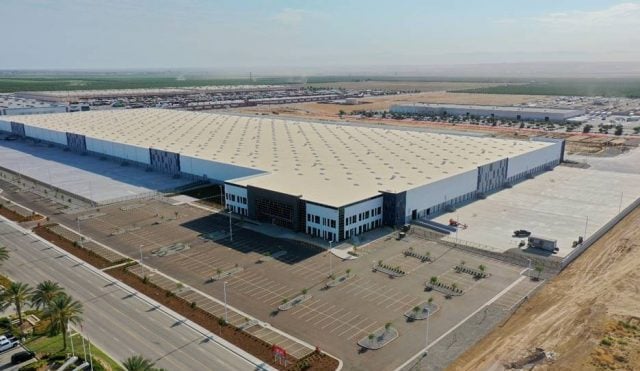LOS ANGELES—Speed and service are king right now, and consumer behavior is more disruptive than ever, CBRE's managing director Adam Mullen tells GlobeSt.com. We spoke exclusively with Mullen and several other industrial experts on what lies ahead with logistics. Stay tuned for a more in-depth feature on how logistics is influencing industrial development in an upcoming issue of Real Estate Forum.
GlobeSt.com: What factors do you see influencing the industrial sector as we move forward?
Mullen: There will be further change in mergers and acquisitions. Especially in companies that are “supply-chain intensive,” we are experiencing a high volume of M&A, and oftentimes the synergy targets focus heavily on supply chain and logistics (and therefore industrial real estate). There will also be growth enablement from retailers through manufacturers, ecommerce to consumer goods and a ton of growth requiring more capacity to fill orders or make goods—all requiring industrial real estate. Business continuity is also a factor. Between port disruptions, truck-driver shortages and weather events, companies are rethinking their overall network and where/how they leverage industrial real estate. Also, consumer disruption—speed and service are king right now, consumer behavior is more disruptive than ever. If the future demands the ability to buy online and have your product in an hour, that is a large and exciting shift for industrial, and if customers ask the manufacturer to hold more inventory and deliver just in time, that is also exciting for industrial. Lastly, there will be a keen focus on energy, sustainability and people—the right people with the right skills, available to work now and 10 years from now—and a focus on energy savings and efficiencies.
Andrew Mele, principal, Trammell Crow Co., East US: Without question, the continued maturity of e-commerce and online retail will be the most significant factor influencing the industrial sector for the foreseeable future. We are still very early in the omni-channel revolution. Many historically brick-and-mortar retailers are still figuring out how to best satisfy their customers online. At the same time, more advanced online retailers continue their quest for same-day delivery. The decisions made by these logistics occupiers will set the course for the future of industrial real estate.
Craig Engelhardt, Managing Director, National Industrial Services Group, Savills Studley in New Jersey:The biggest factor will be interest rates. The value of most industrial buildings is pegged on a simple cap-rate calculation—the net income of rent divided by a rate of return. In some key markets, that cap rate is as low as 4%. If those rates start to creep up, the entire balance of rents and building valuations will be in flux. Another factor is consolidation among REITs. The number of large industrial landlords has been reduced significantly over the past decade, and we anticipate that trend to continue. That said, there is also new foreign money investing in real estate now driving up pricing on industrial.
Marc Lebovitz, principal, Woodmont Industrial Partners, president, Romark Logistics: Labor availability will be an important factor going forward, especially once the Panama Canal opens and as logistics continues to grow organically. I believe that technology will also play a larger role in the industry. Amazon and some others are already exploring this territory, and forward-thinking companies will continue to seek out ways to use technology to increase productivity, while reducing inefficiencies in the supply chain. As we go forward, I think many developers will find it more and more challenging to identify buildable sites for industrial properties. As buildable land becomes more scarce, we'll likely see a wave of redevelopment to update existing industrial properties.
Nick Kim, managing director, Transwestern, New Jersey: We expect increased interest from New York City companies, since end users are being priced out of New York and increasingly turning to New Jersey, where incentives are in place, prices are attractive, logistics are more favorable and occupancy costs are lower—seems like every license plate on industrial tours in NJ is from New York. As companies seek to relocate to NJ, availability of labor is even more of supreme interest. Rising interest rates could be a factor down the line, but not in the near term. Also, we will see improvement in intermodal-rail infrastructure to support increased cargo on the East Coast.
Jeremy Garner, principal, Trammell Crow Co., Central US: The resurgence in manufacturing in the US and Mexico will have a significant impact on the industrial sector for years to come, as will the continued growth in e-commerce. Increasing labor costs in China, particularly relative to labor costs in Mexico, has led to a wave of companies bringing manufacturing back to North America, and the lower cost of natural gas resulting from the shale boom in the US has led to an estimated $50 billion in petrochemical-plant expansions along the gulf coast in Texas and Louisiana. Natural-gas prices in the US are now three to four times cheaper than in China, India, and Europe, giving manufacturers with significant power requirements a meaningful reason to return home. In my experience, demand for both e-commerce and manufacturing space are increasing. E-commerce and manufacturing operations both generally require more employees, parking, power, and climate-controlled space than typical warehouses and distribution centers, thus resulting in higher tenant finish costs and lease rates.
© Touchpoint Markets, All Rights Reserved. Request academic re-use from www.copyright.com. All other uses, submit a request to [email protected]. For more inforrmation visit Asset & Logo Licensing.






